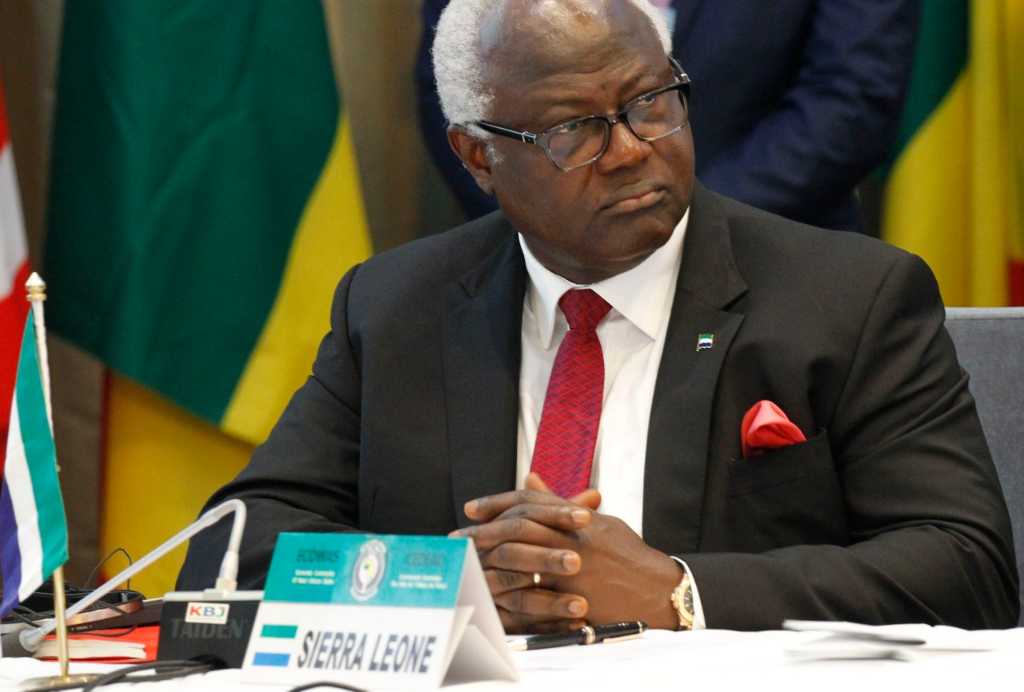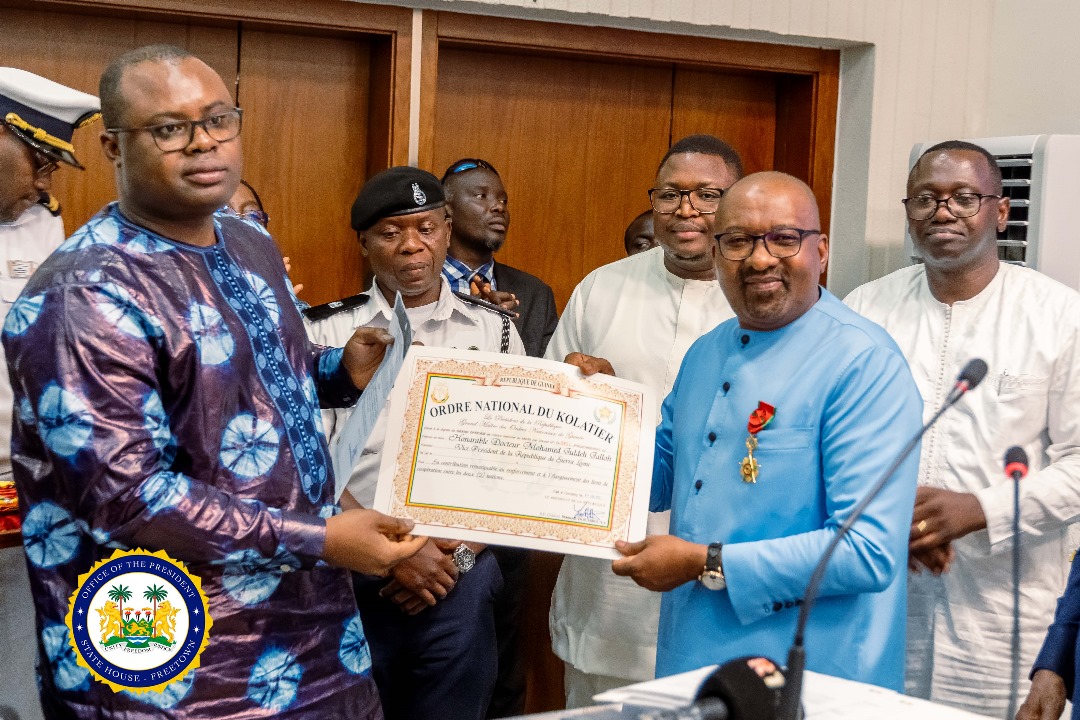DEFEND TRUTH
AFRICAN DEMOCRACY OP-ED
The smell of vengeance — former Sierra Leone leader Ernest Bai Koroma charged with treason
By Greg Mills and Ray Hartley 07 Jan 2024 Follow
Ernest Bai Koroma is one of a small group of former African heads of state who have relinquished power peacefully and honoured democratic processes. Attacks on his freedom should be viewed with great concern by the international community.
On Wednesday, 3 January, Sierra Leone’s ex-president Ernest Bai Koroma was charged with treason and three other offences in the capital, Freetown. Those found guilty of treason can be sentenced to life in prison.
Koroma was arrested after what the Sierra Leone government has described as a failed coup attempt following the re-election of President Julius Maada Bio in June 2023.
Koroma is one of a small group of former African heads of state who have relinquished power peacefully and honoured democratic processes. The attacks on his freedom should be viewed with great concern by the international community, given the attacks on democracy through a rash of recent coups across the Sahel and into West Africa, from Niger through Mali, Burkina Faso, Guinea and into Gabon.
A former teacher and insurance executive by profession, Koroma stood for the opposition in the 2002 Sierra Leone election, losing by a landslide to the incumbent, President Ahmad Tejan Kabbah of the Sierra Leone People’s Party (SLPP), who received 70.3% of the vote. Koroma won the August 2007 election with the All People’s Congress (APC).
During his time in office, Koroma consolidated Sierra Leone’s emergence from failure and civil war and weathered the Ebola crisis in 2014. After handing over power to Bio, he became a leading African statesman, participating in and leading election monitoring missions.
To understand Koroma’s plight it is necessary to understand his relations with Bio, who took over from him in 2018.
Deteriorating relationship
As a brigadier in the Sierra Leone army, Bio had ousted Captain Valentine Strasser in a palace coup in January 1996, shortly before the country’s already planned return to civilian rule two months later. Thereafter, Bio moved to the US where he was granted political asylum, returning to Sierra Leone to compete in the 2012 presidential election, in which he was soundly defeated by the incumbent, Koroma.
ADVERTISEMENT
Six years later, Bio defeated former finance minister Samura Kamara, who stood for Koroma’s APC in the run-off for the presidency.
Bio set about overturning his predecessor’s policies, of which he had been a stern critic in opposition. He systematically removed Koroma’s security and other presidential privileges. Immediately after taking office, Bio’s government announced commissions of inquiry into the performance of the previous government, indicting Kamara on corruption charges.
With increasing public protests over the state of the economy, the already strained relations between the two deteriorated further in the run-up to the general election on 24 June 2023. Although Bio was re-elected with 56% of the vote to Kamara’s 41%, the result was disputed by the opposition APC, which cited “glaring irregularities” and demanded a rerun. International observers noted statistical inconsistencies in the results and a lack of transparency.
Even before the 2023 election, Koroma went on record saying that the best way to foster political inclusiveness was to reach across the political aisle and to not go after your political opponents. In a speech to Afrobarometer on the means to make democracy work in conflictual environments, he said it was critical to “detoxify the politics and foster inclusiveness”.
His first step after being elected was “to send the right message for a smooth transition. Immediately after I had been officially notified … I drove to the outgoing president to thank him for his service, for presiding over the elections, and to inform him that I would be calling for his wise counsel periodically.
“I then moved to the outgoing vice-president, who lost the elections to me, and found that the Inspector-General of Police had already withdrawn his security detail. I telephoned him right away and instructed that the full complement of the vice-president’s security be restored immediately. I then assured him of his safety and that he could stay at the official residence until such a time he was ready to move to his private residence.”
‘Dangerous precedent’
The claim that Koroma was involved in a coup attempt lacks evidence and is a backward step by the government of Sierra Leone.
On 26 November, attacks by gunmen on a military barracks, a prison and other locations resulted in the deaths of 20 people and the freeing of more than 2,000 inmates.
Koroma condemned the attacks shortly after they happened. Yet Bio’s government claimed that the action was a foiled coup led by Koroma’s bodyguards, several of whom were attacked afterwards in the former president’s compound.
Koroma’s lawyer, Joseph Kamara, has said of the charges against his client: “A dangerous precedent has been set… We are dragging a former head of state — democratically elected — on trumped-up charges under a political vendetta.”
International efforts to broker a settlement, including those by the Ecowas court, allowing Koroma temporary exile in Nigeria, have been rejected by Bio’s government. There has been a crushing silence from donors and civil society bodies, among them the Tony Blair Institute, which has worked in the country for more than a decade.
The Paramount Chief of Kuffa Bulam, as Blair is styled locally, is revered in Sierra Leone because of the UK-led military intervention in 2000 that helped to defeat the Revolutionary United Front, ending a civil war that had cost 50,000 lives. Such roles — and titles — are hollow statements of intent without support for the inner workings of state success, including democracy and the rule of law.
Britain remains the largest bilateral donor to Sierra Leone, providing £21.1-million, or 10% of the average annual aid spends.
Given the documented intense pattern of physical harassment of Koroma, to remain schtum on such issues is an own goal against democracy and stability, particularly in the face of growing Chinese and Russian regional roles. The same applies to President Mohamed Bazoum in Niger, who remains under lock and key since the overthrow of his democratically elected government in July last year by the head of his presidential guard, General Omar Tchiani.
African democrats should be expressing their concern too, since this could happen to them. And in Sierra Leone, instead of persecuting Koroma, the government should work with him to build and entrench democracy in a country familiar with the bitter taste of civil war.
It’s in the enlightened self-interest of all leaders to treat their predecessors with respect and within the law.
To do otherwise simply reeks of vengeance.










